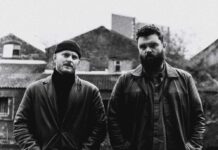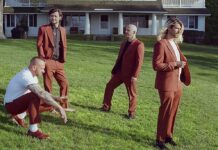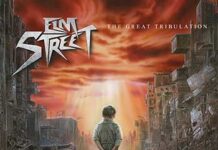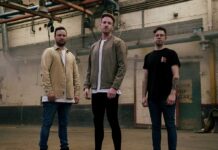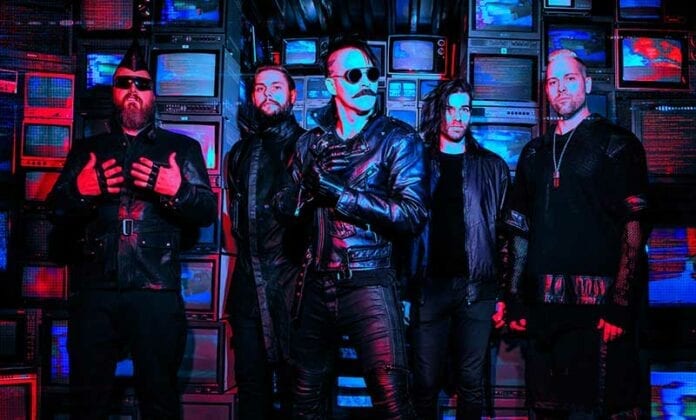
INTERVIEW WITH ALEXIS MINCOLLA BY ANABEL DFLUX
PHOTOGRAPHS BY SEQUOIA EMMANUELLE
LIVE PHOTO COURTESY OF 3TEETH
3TEETH is a band that is hard to ignore, with heavy riffs and ideological undertones, not to mention a stage presence that intoxicates a room. With the band right on the cusp of its forthcoming release Metawar, its first time sharing the spotlight with a major label, we were able to get right into the mind of 3TEETH frontman Alexis Mincolla.
July 5th is just a short time away. How are you feeling about the release of Metawar?
I’m excited. I can’t wait. It just feels like it’s been forever. This is our first major label release, which being on major label timelines has been new to us, because of the instinct when you finish something, create something, you wanna share it with the world as opposed to like sit on it for nine months. I’m a firm believer that when you create something, it’s about getting it out there as soon as possible because it’s gonna resonate with the energy of that moment and that time, as opposed to waiting on it like a barrel of aged wine to release years later. It’s weird for us to do that stuff. I can’t wait for it to come out. I’m super excited to share it. It’s an album that we worked extremely hard on making. It took us a full year of our lives to make this record, which we’ve never really been able to do full-time on a record because we were all working part-time jobs and just getting together on the side and self-producing our previous two records. So, this is our first, real, full-time, fully dedicated record that we got to really make what we wanted to make as opposed to other records that you had to be complacent or like, “Well, we wanted to do this, but we didn’t have the time or the money, so we did this instead.” This is a record that I really think defines us for doing exactly what we wanted to do and having a clarified vision and just saying, “Hey, let’s take the time to make this target and then hit it.”
“DESCRIBING MUSIC ASIDE FROM THE TECHNICALITIES, YOU REALLY WANT SOMETHING TO EVOKE SOME SORT OF VISUAL SPAWN.”
Bringing that whole idea to fruition in its entirety. So, talk to us about the writing process, what was that like for you?
It’s different with every song. I don’t think we like to constrict our songs to a particular writing process, like, “Oh, it’s gonna start with a riff,” or, “Oh, we have a cool bass line or synth.” For us, it can start with a riff, a bass line, a lyric, or a concept. Occasionally, we’ll create some sort of image, like I’ll design an image that I have a song title in mind and maybe some lyrics to what could be the chorus, and we’ll create this image that gives us an aesthetic target for writing around. It gives us a frame of reference when you’re collaborating with four or five people. Let’s say all you have is a metaphor, when you’re collaborating, often times describing music aside from the technicalities, you really want something to evoke some sort of visual spawn. “I thought we could make it sound like this.” So, instead of having it “like this,” you can actually create a visual image to make it sound like the way this looks. So, we like to do that, and create these North Star images that give us a sense of directionality. So, that’s something that we do that’s unique and weird.
That is very unique, but it makes a lot of sense to have a baseline that you’re building upon.
Yeah, because otherwise you sit there and argue with your bandmates, because you can get into bad shit, “Well, no, I want it to sound like this or like that.” At least we can all agree on an image. “This song should sound the way this image looks,” then it removes a lot of subjective discrepancy that could come up. There obviously is going to be room for that, but at least it’ll give us like, “Hey, that bass line does not sound the way this image looks.”
Art is a very full rounded concept. It’s both digital and audible, so it’s great to be able to combine it.
Absolutely, especially today. The internet is not an audio forward system. You have to get past two rows of imagery before someone is gonna click on your music. So, to think that your gonna get away with saying, “We want to stick to the music and let the music shine,” I wanted to approach this in building an art project on the chassis of the band, because the band is the ultimate art project. My background is a visual arts guy and art director. I love that I get to create imagery to support the sound of the project and vice versa. I think the aesthetics of the project is very much a priority for us as a band and almost a necessity to a band these days.
“IT’S A HUGE CHALLENGE THESE DAYS TO THINK ABOUT WHAT YOU CAN DO THAT’S GOING TO BE DIFFERENT AND UNIQUE AND NOT BE COMPLETELY OVERUSED.”
Like you said about social media and the internet, words don’t entice people anymore. They want to see a picture.
Totally. People need to see stuff to get excited now. We scroll through probably thousands of images a day just nonchalantly with our thumbs from the time we wake up to the time we go to bed. We are so used to being bombarded with so much imagery, and it disrupts that verbal communication and cut through. It’s a huge challenge these days to think about what you can do that’s going to be different and unique and not be completely overused. It’s a huge challenge.
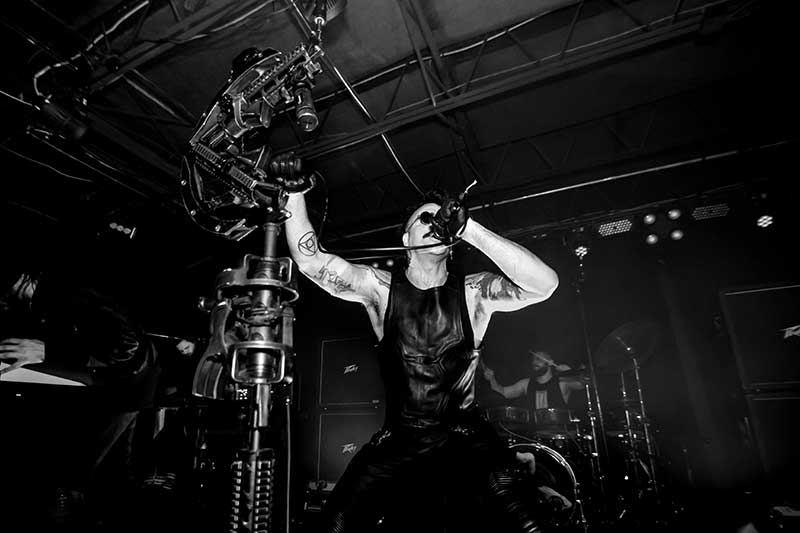
About that topic of imagery, the album cover, were you the artist for it?
I art directed it. I came up with concepts. I knew exactly what I wanted. It was cobbled together from a black glove that I have with these claws on it, and I literally shot the thing with an apple in my hand and then comped out the green apple and started to put on this red earth drifting with this sort of boil. I wanted to bring in two other people—someone from Russia and someone from Germany—and then myself, and we collectively designed it from three corners of the earth to get everyone involved. So, I had a Russian artist do the 3D, and then I had a German design or help me with the typography. The whole thing was fairly inspired by a book, and the idea that the oil is this sentient creature that is driving everyone, that is this Lovecraftian existence of a Thulerian god that lives inside the earth, just to drive some really weird, deep concept with it, then create this sort of mythos. I don’t want to reveal too much, because I want people to connect the dots. I think that’s where I’m gonna leave it at.
I take it that’s probably where you drew your inspiration for this album.
Yeah, there’s a lot of inspiration that comes from various things that I was reading at the time. Some concepts of theory fiction like they are complete fiction but they’re postulating theories of existence within it, because I do think we live in this time period of fact is totally stranger that fiction at this point. And I think that those lines are blurring immensely, so I just explore keeping magic and science a space that I’m fascinated with. For us, we dug down deep and really explored a lot of weird concepts in this record. Some are fairly cryptic and then there’s some overtones that people will pick up on fairly easy, but for the deep divers there’s gonna be plenty.
“IF YOU’RE NOT CONTRADICTING YOURSELF, YOU’RE NOT THINKING HARD ENOUGH, BECAUSE I THINK THAT WITH ANY IDEOLOGY, THERE’S A COUNTERPART THAT MAKES SENSE AS WELL.”
Your music brings to question the ideologies that society holds sacred. What pushed you to use music as a tool for activism?
I’m not even sure I’d call it activism, but sure, activism, for lack of a better word. My background is political science. I have two degrees in political science, minor economics, I studied in Rome for quite some time, and it’s something that I’ve always been fascinated with, just the way the world works, what makes us tick, and my studying didn’t stop there. I think the things that fascinate me more are physiological. Everything we are doing today is something that’s already happened in one way, shape, or another. The internet is actually not that different from when we created the printing craft and information was flying off printing presses for the first time—it was like the first information age. And when the first information age happened, crazy things happened in France, and people would discuss ideas and violence was popping up on the streets and they were beheading kings. And it’s what ushered in the scientific revolution, and things that led towards the idea that created America. You have these evolutionary and revolutionary times that are marked by tremendous sense of turbulence in society. We have all this information we don’t know what to do with it, and it’s creating this amazing, turbulent time that we live in. But as a result of looking back to history and what came out of that, I think there’s maybe a little bit of hope that we can say, “Well, let’s see what comes out of this.” We can always learn from something that’s happened. For me, I’m just fascinated with looking at the thing in a holistic scale and doing these deep dives into history and understanding where we exist today. I wouldn’t call it activism as much as awareness of what we’ve done. Most people have a lot of political ideas without any understanding of history, which I think they’re just regurgitating a buzzword that they heard on the latest 30 minute news site, which to me is very agenda driven. I think their incentive is ideology instead of intellectual and studying. If you want to hold some sort of ideology sacred, it should be founded in some deep study, as opposed to, “Well, this is what I learned from television news.” I just want people to question what they’re thinking and hold it very sacred. If you’re not contradicting yourself, you’re not thinking hard enough, because I think that with any ideology, there’s a counterpart that makes sense as well. That’s what we’re advocating. We’re not here to push any agenda on the right or the left or standing up for any particular group of people as much as we are just saying stand up from the human brain.
Knowledge is a gift and not enough people appreciate it.
Yeah, we live in not very intellectual times.
It’s interesting that you chose industrial music. Do you feel it’s because it audibly portrays the tumultuous times?
I think industrial music always does. I think that’s what defines industrial music, for me, at least. I’m not some industrial aficionado, but I think industrial music is a sonic palette that is more defined by the context in messaging. Even the term industrial, if you want to critique society today, you have to critique first the industrial revolution, much like Tolkien was doing in his work. Maybe Tolkien was the first industrial artist? But, for me, it’s like deciding which way is sucking the poison out of a mass production society and spitting it back on its own face, and I think that industrial music has always been a good way to hold up this fun house mirror to what’s really wrong with this world.
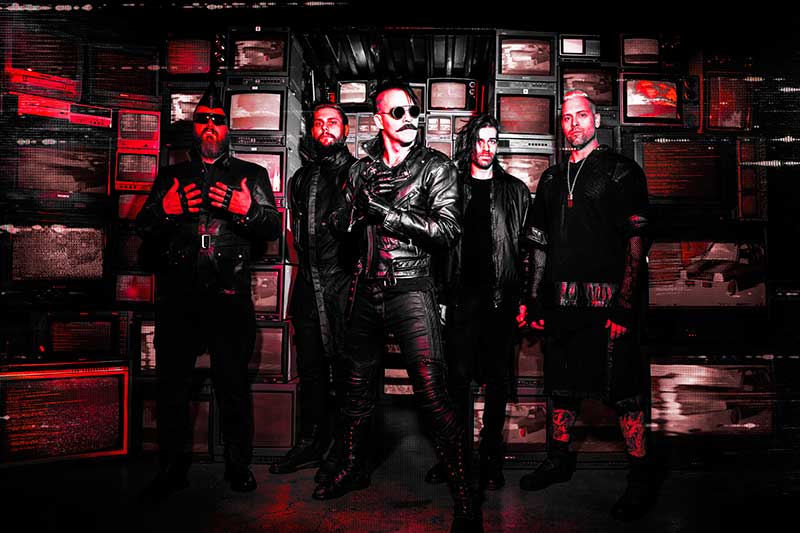
And how do you feel about the state of industrial music today?
I don’t know. I don’t really feel prepared to speak on behalf of it because I only really know what I’m doing. But I think that a large part of the impetus of why I wanted to start the project is based on maybe a little bit of discontent, like that’s what I wanted to hear and what I felt like I wasn’t getting enough out of industrial music today. If you think of synth, there’s been a little bit of a resurgence. There’s been a few other projects that I think are really cool that have popped up. I’m not saying there’s some sort of industrial renaissance, but it’s in a better place now than it was maybe six years ago. I also think industrial music is a very experimental genre, and where strictly the 90s were a really key era of industrial music, I think where we are with technology today, especially in terms of music, allows for a lot of new space and a lot of new flesh to be grown out of being able to experiment with new audio technology and pieces of really cool hardware. There’s cool VSTs and cool audio interfaces, and all sorts of really new things that allow you to cross the boundaries sonically, so I think it’s an exciting time for industrial music.
And to dabble back to your record, who produced it?
Sean Beavan—who worked on Nine Inch Nails’ Downward Spiral, he co-produced Antichrist Superstar with Trent Reznor, he did Mechanical Animals for Marilyn Manson, he is just a guy we have known since our last record, as he mixed our last record. He’s become a really close friend that is an amazing collaborator, a person that really understands what we’re trying to do with industrial music, as he’s been doing it for…he did live sound for Nine Inch Nails all through the 90s, he’s a guy that understands taking the abstract elements of what industrial music can be at times and really creating a coherent sound with it in terms of aligning it with its intention. It’s not like, “We’re just gonna make it loud and noisy.” Going back to the initial point, “Let’s make it sound like what the song is about.” Sean is a person we had a great time working with on this record.
It’s always awesome when you meet someone that has a very similar vision to yours.
Totally! Everything about working with Sean couldn’t have been more perfect. From a guy who worked on some of the records that inspired us to do what we do to fully understanding what it could be today, it was never like, “Let’s make it like The Downward Spiral.” It was more like, “Let’s make it as if The Downward Spiral happened in 2019.” We weren’t trying to make something old. We weren’t trying to make a throwback, retrospective homage of a record. We were trying to force the territory with an understanding of the foundation of what had come before us.
3Teeth opened for Tool in 2016, which cemented your band’s mainstream appeal, and you have since toured with Rammstein, HIM, Danzig, and many more, all before signed to a label. Why did you decide to sign to a label, and how has it been for you this far?
It’s been interesting. There’s so much to this project, so much heavy lifting. I started of by managing the band, booking the band myself. I used to create all the commercial imagery. I’d figure out how to market our record, just doing everything to the point where it was burning me out. I loved this thing I called everything-ism, where as an artist you have to be able to do everything today, but it started to affect the artistry to the point where your band lift is so maxed out that we’re spreading it thin. Then I didn’t really have the time to do the part that’s really important, which is the art, and I felt that working with a label essentially takes some work off my plate and is someone that I can grow with as a strategic partner to help amplify the message that we were creating. It just felt like the right time for us, and in terms of figuring out the weird growing pains that come with that, yeah, it’s been weird and it’s been a challenge at times, but I think that every decision as a band on the larger scale, it always ends up being a double edge sword. I’m very happy with the decision I made, the rest of the band as well, but there’s definitely some clashing with us and the label, not about creative stuff, but there’s been some butting of heads. We just shot a music video where we put a bunch of hooks in a girl. I couldn’t put that in the treatment because the insurance company wouldn’t have allowed it. So, I have to beg for forgiveness instead of ask for permission, which is never fun to do, and I never would have had to do that before, but when some label decides to show up to your video shoot and they realize what you’re doing and say, “Hey, you guys should leave now,” there could be a little bit of friction, but those are things that I’m willing to deal with.
“IT’S FUN, ESPECIALLY IN THE CONTEXT OF WRITING A VERY ANTI-SYSTEMIC, ANTI-CORPORATE MUSIC, TO BE FIGHTING, AND TO PUSH THESE WEIRD CRYPTIC AGENDAS.”
I think that is the natural order of things, musicians are supposed to butt heads with their label.
Yeah, totally! I’m just talking about tension in general, like if you don’t have the right tension in your guitar strings, you’re not gonna be able to play the right sound. So, for us, these relationships and the tension can help elevate a project, because you need that push and pull. It’s fun, especially in the context of writing a very anti-systemic, anti-corporate music, to be fighting, and to push these weird cryptic agendas. If you want to change systems, you have to infiltrate systems. If you want to cut down a tree, you’re gonna need some wood to build an ax.
You find inspiration in that as well and storytelling, and music is storytelling.
Absolutely, and we’ve put out two niche, weird industrial records before this, so it’s like, “Do I need to do a third one of this?” “No, I don’t.” I wanted to do something where it’s, “Hey, can we attempt to put a toe in this world while we maintain the integrity of what we do?” And I love that, I like that challenge. I like saying, “Hey, can we give Sony a record that they feel they can sell?” Which that’s a fucking challenge for a band like us, where we know we are never gonna completely write the mainstream bullshit, but can we write stuff that has enough encoded messages? Yeah, it made us push ourselves harder.
It’s also pushing the labels a little further, too, to get them out of the idea of a band needs to fit in a box.
Totally, and I’m very comfortable with swimming with sharks, putting myself in positions where I have to be hyper heads up because there might be people trying to take advantage of a situation. I feel like keep me on my toes, which is a weird thing to enjoy, but I get bored if I don’t have challenges.
The day that you stop challenging yourself as an artist, you’re dead.
Totally! I completely agree with that!
So, you’re originally from Boston, and you have since relocated to Los Angeles. What was the shift like for you?
I’ve lived in a bunch of places, but after Boston I actually moved to Rome. I lived there for five years and did my university, then I moved to Miami for a little bit, then New York, and then LA. It wasn’t a Boston to LA complete culture shock, so I had enough weird experiences before that to say, “Hey, LA is not that weird,” because LA actually is that weird. LA is a very bizarre place, and it’s in many ways the complete opposite of Boston. Places like Boston, it’s very heavy gravity and you’re forced to find a work ethic there. And LA doesn’t have a lot of gravity, which allows for people to have bigger ideas, but there’s also not a lot of work ethic. So, a place like LA allows me to have big ideas, which is a good place for what I’m trying to do.
That has to be the most accurate description I’ve ever heard of Los Angeles, and I’ve lived here my entire life.
It’s like how Superman came from Krypton, where there was tremendous gravity, then came to Earth and he could do leaps and bounds because there wasn’t the same gravity. But at the same time, when there’s a place with not a lot of gravity, there’s a lot of people that completely detach here and they float so high and there’s nothing tethering them and they’re not doing anything. Those people, they could use a little bit of gravity, they could use something to anchor them. In a town like this, there’s a lot of people who are dreaming, but there is not a lot of people who are actually doing the work. So, I think coming from a place like Boston really helped in giving me a sense of drive and work ethic, and then you bring that out here and it helps.
All the moves that you’ve done throughout your life, how does this effect your creative process in regards to music?
I liked moving to new cities because it allowed me to reinvent myself. I think that moving to a new city is scary to a lot of people because, “I don’t have friends there. I don’t know what to do there.” The idea that you can continue, that you can evolve and reinvent with every time that you move is something that allows you to grow as a person and also not rest on the laurels. I always felt that by four years you were getting enough traction in a city because you knew enough people and you do enough work and you felt like you can actually make something happen. I’ve lived here for 10 years now. And I think that doing these four year, five year stints in living in cities before this really allowed me to continue to evolve. I feel like I’ve lived five lives, like each city was a life, which I think is always weird, but there’s something beautiful about that. Traveling in general is always such a great reminder of what you don’t know. People like to think they know everything, but they’ve lived in the same city their whole life. Every time you move or every time you travel to a different country, you are reminded of how little you know. There’s something important in reminding yourself of how fucking little you know, like an Aristotelian concept—the wisest animal understand how little he knows. You can never fake you know a lot, then you’re just an idiot.
Travel is the cure to birdcage syndrome where all you think the world is the cage you’re living in.
Exactly. I know a ton of people like that, especially from back home.
Oh no. Tell them to go to Europe once in a while.
Yeah, it’s important. Go to a country where you don’t speak the language and tell them to buy a toothbrush. The littlest thing becomes like, “Wow, this is crazy!” Trying to buy a toothbrush in France, it’s a fucking adventure. Anything can happen.




